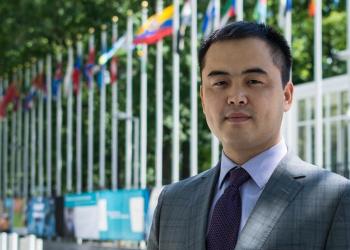Perspective: Ensuring substantive collaboration with civil society in implementing Agenda 2030
The meaningful involvement of civil society in the creation of Agenda 2030, adopted by the General Assembly a year ago, has been key to its creation. This plan has the potential to be “transformative” and a “historic turning point for the world,” in the words of Secretary General Ban Ki-moon. But this can only be true if civil society’s engagement continues to be meaningful in the implementation phase.
Anniversaries are a good time for reflection. Examining a few of the insights developed during the Agenda’s formulation might be useful going forward, particularly in understanding how we can maintain and even strengthen the involvement of civil society.
To that end, it is worth examining what was learned from a longstanding series of breakfast meetings that sought to bring together diplomats, UN officials and representatives of civil society in New York to discuss the post-2015 development agenda in real time, as it was being negotiated. In that light, one insight that emerged is the usefulness of what Baha’is call “consultation” in strengthening the bonds among participants, engendering respect for the value of all perspectives, and encouraging a collective search for common understanding.
Launched in July 2012, and cosponsored with International Movement ATD Fourth World, the meetings have been held roughly once a month. Each has focused on a particular topic, in parallel with the negotiations at the UN.
The topics discussed ran the gamut of issues facing negotiators as they put the Agenda together. How the Agenda is to be financed, the end of traditional “north-south” distinctions, the impact of conflict and violence on development, the role of civil society, and how the Agenda can be most effectively communicated, implemented, and monitored.
The meetings explicitly sought to bring diverse parties together in an informal, egalitarian setting, to enable a free exchange of views – something that participants said they found to be often lacking at the UN.
“Part of the problem with the UN is that it is very formal,” said Francois Gave, Counsellor for development and sustainable development with the Permanent Mission of France to the UN, who was a frequent participant at the meetings. “It is rarely interactive; those who do things on the ground rarely speak out. And that is why [these] meetings are helpful. They are more interactive, less formal, and doers sometimes speak out.”
John Gilroy, First Secretary of the Permanent Mission of Ireland to the UN, another frequent participant, said his mission appreciated “the variety of opinions, across member states, the UN system and civil society.”
“It is never just like-minded navel gazing,” he said. “Many other meetings see the discussion taper out after the main speakers intervene.”
To achieve this goal of openness, the Baha'i International Community used several tools. One was the use of the Chatham House Rule, which states simply that participants may freely use the information received but without identifying the identity or affiliation of the discussant.
“We like the use of the Chatham House Rule,” said Evans S. Maturu, Counsellor at the Permanent Mission of Kenya to the UN. “People can express their views freely and it’s a place that encourages people to say what is on their minds. It is very informative.”
The breakfast meetings also sought to employ elements of a principle-based approach to collective decision-making that is practiced by Baha'i communities around the world. This process, referred to as “consultation,” approaches decision-making as a shared effort to explore the underlying reality of a situation – to structure discussion and dialogue as a collective search for common understanding.
Within such a framework, ideas and suggestions that arise in conversation do not belong to any single person or entity. Nor does their success or failure rest on the reputation, status, or influence of the individual or institution that put them forward. Rather, proposals and insights belong to the group as a whole, which adopts, revises, or discards them in whatever way conduces to the greatest understanding and progress. And through this process efforts are made to ensure that all voices are heard and the maximum possible participation is achieved.
Crucially, consultation seeks not only to determine the reality of a given situation, but equally to strengthen the bonds that unite participants. Frank and open discussion will often yield differing viewpoints, particularly given the diversity of culture, history, and experience represented on the international stage.
When approached constructively, this range of perspectives can reveal unexamined assumptions and bring to light new concepts and ideas. In this spirit, participants explore diverse viewpoints in a way that promotes progressively higher levels of shared understanding and cultivates unity of thought and action. Each forward step – far from representing a momentary triumph of a single person or faction in an environment of competition – becomes part of a collective process of learning by which international institutions, states, and civil society advance together in understanding.
Agenda 2030 is now entering a new phase: that of national-level implementation.
The participatory processes that guided the creation of the Agenda at the international level must also be incorporated in discussions at the national level – and certainly in discussions between the UN and national-level counterparts.
What has been learned from the breakfast meetings in New York is that such discussions are most productive when they are inclusive and held in a manner that encourages all parties to openly and freely share their concerns, in a positive and constructive atmosphere. Certainly, that is the spirit of consultation.
I hope that experiences like these can be replicated as important tools to help make the UN more “fit for purpose” and to encourage a continuation of the new patterns of interaction that marked the development phase of Agenda 2030.
-- Serik Tokbolat, Representative of the Baha'i International Community to the UN
[Editor’s Note: An overview of the breakfast meetings can be found in ONE COUNTRY, the newsletter of the Baha'i International Community.]
